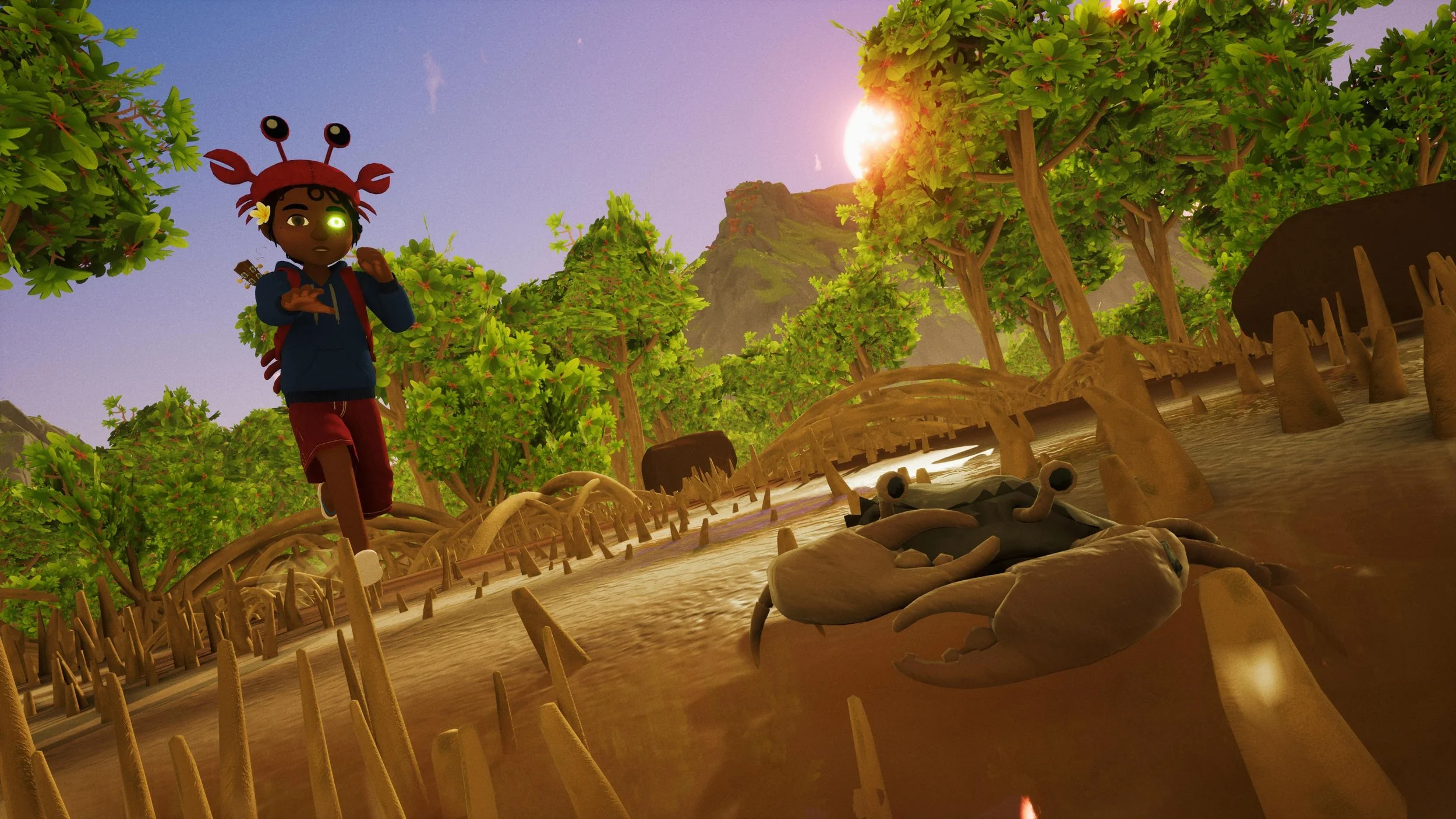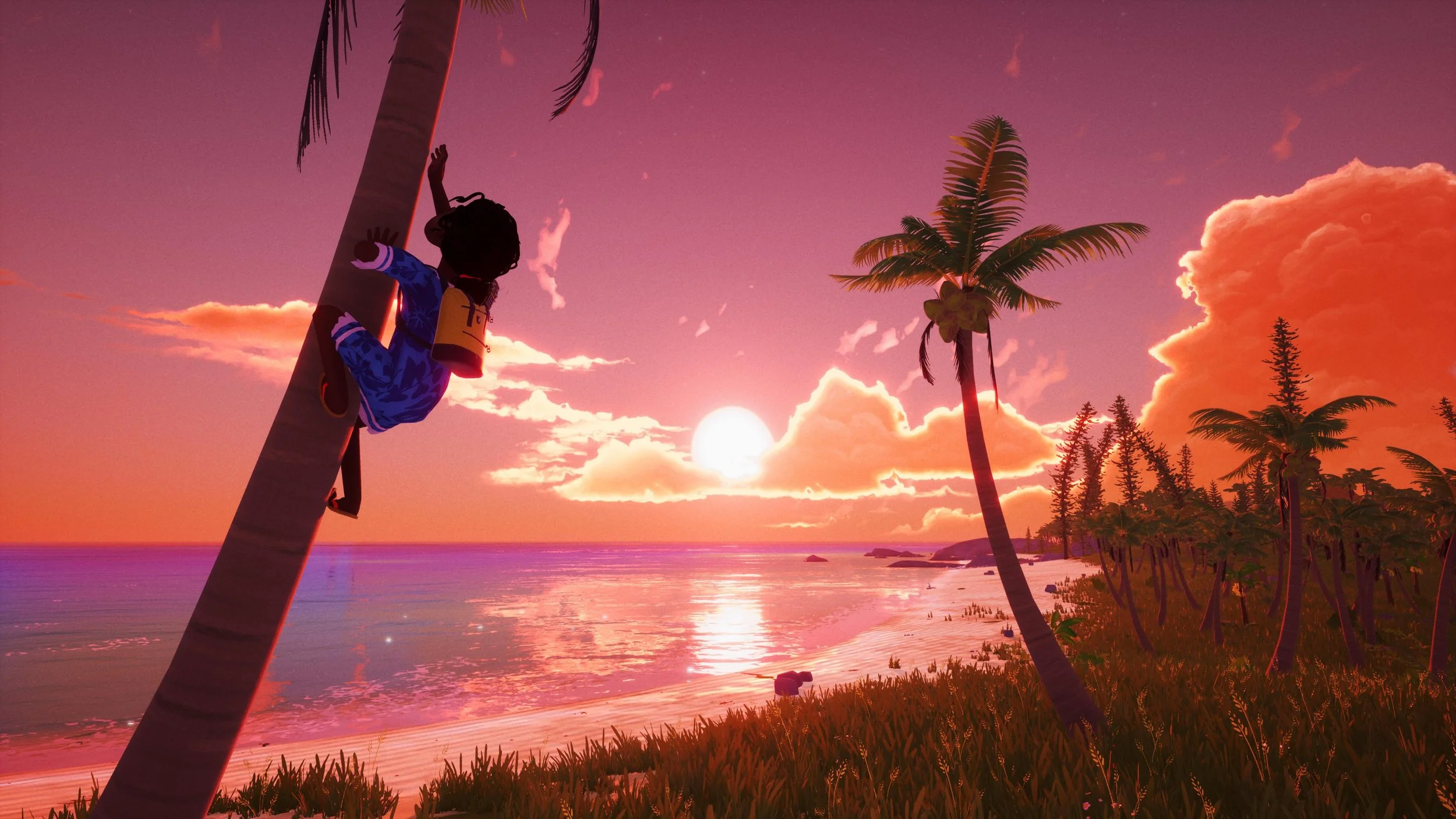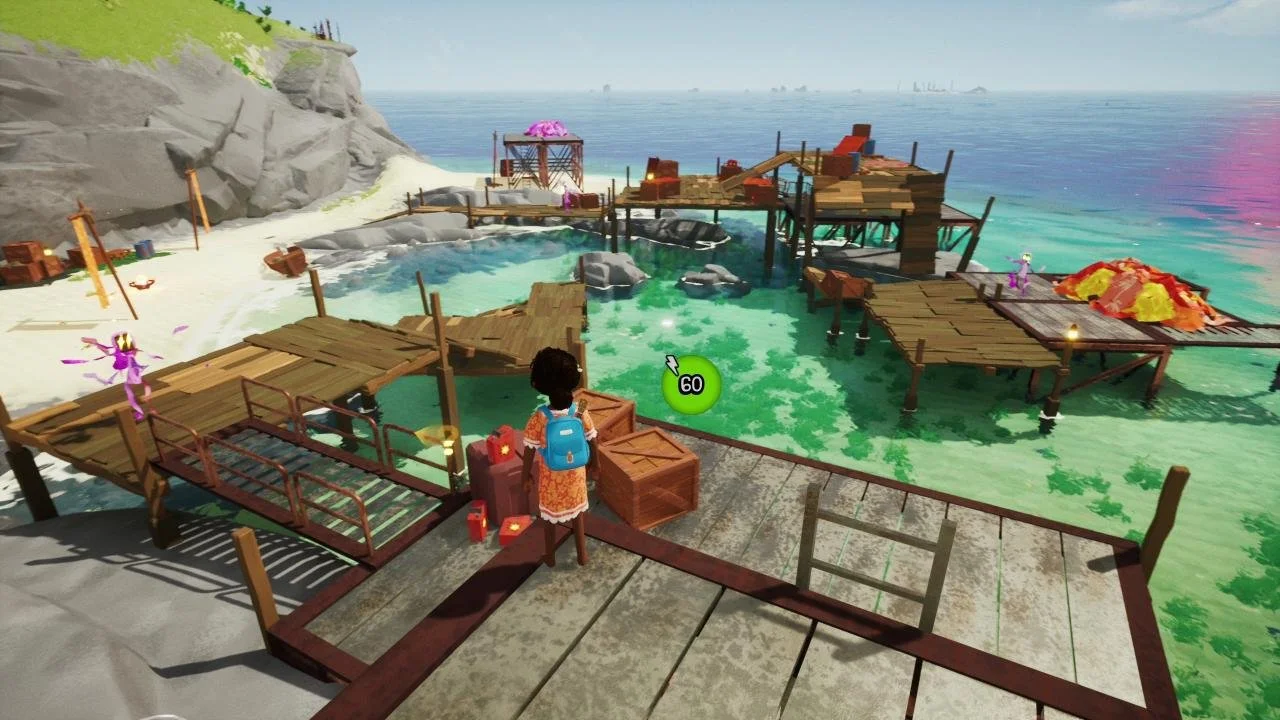A passionate odyssey.
Going into Tchia, especially based on its artwork, lead character, and brief glimpses of its gameplay, I was largely expecting a very charming open-world game that felt like a mix of Breath of the Wild and Dora the Explorer. However, during the game's opening moments, and the hours that followed, Tchia feels more rooted in something akin to a teen-rated Far Cry, complete with a baby-eating god and a few buckets of blood. While Tchia may not be what I expected, it largely succeeds in telling an emotional story surrounding the home of its studio, an emotional tale that will resonate with you well after it wraps up.
In the game's opening moments, Tchia is living a peaceful life on an island with her father. When an acquaintance of theirs visits, they discover he was followed by a man from her father's past who has finally tracked them down. As her father is taken from her, Tchia’s powers awaken, allowing her to soul jump into the blade held by his captor, slicing him across the face, but then exhaling her soul from the blade and falling into the ocean below. Rescued by their mysterious friend, Tchia begins a quest to find her father and get to the bottom of a mystery that will shape her future forever.
While the story starts off rather peaceful and really kicks into gear when her father is abducted, I was actually surprised at how dark and ‘out there’ it eventually goes. There were more than a handful of moments where I didn’t think the game was going to ‘go there’ and it does, often in a very violent way that can often work against the game’s visuals and appeal. I mean this in that this isn’t a game you set your kid down to play but rather play alongside them. That said, there is a nice moment with Tchia and another character, utilizing a flower that Tchia has placed by ear that was very enjoyable, as well as seeing where that would go later on.
The main component of Tchia is her ability to transfer her soul into small objects and the wildlife that make up the two main islands of this tropical archipelago. From birds to chickens, deer, and gas containers, you'll use this power to transverse the island, solve a series of puzzles, races, and more, as well as the combat encounters you engage with across the roughly 10-hour journey. Combat is largely against beings composed of fabric called the Maano, created by an evil ruler named Meavora, someone you'll get to know quite well due to a few moments of drawn-out exposition. If I had to nitpick the delivery of the game’s story, these moments simply last too long.
This soul-jumping ability works well as it is governed by a soul meter that you can work to improve as time goes on. Several animals can aid in traversal, such as letting you soar through the sky as a bird, barreling through the ocean depths as a dolphin, or sprinting through the forests as a deer. Soul transfer works as easily as aiming a cursor and targeting your choice of animal or object, and then ensuring you have the soul juice to stay housed within. While this is balanced well enough with small contained encounters or the methods of traversal, the game eventually gets to the point where you are taking out a series of massive enemy bases; a few too many, in my opinion.
It is in these moments where I don't feel Tchia works to its strengths. The action moments are paced well in many of the game’s cutscenes which are well produced, but the onslaught of bases in the game's final few hours feels just too long here, given you are roaming around the bases and trying to track down explosive rocks or containers to destroy the fabric enemies and destroy the base itself. Thankfully, the game has a feature to skip the current gameplay segment. You can use this to skip travel to your next location, or auto-complete the current enemy base and move onto the next. Throughout my time with the game, I tried this on one of the bigger bases, as my attention span for this part of Tchia was starting to wane. With one more objective left to take on, I skipped it and it played the cutscene of the base then being destroyed.
Combat itself is initially inventive by being able to soul jump into lanterns and gas canisters to set your flammable foes on fire, but ultimately, it doesn’t evolve past that. There are no real threats to take on that require anything different from jumping into a flammable object and then rolling around and exploding it near them. It’s a shame since the bulk of this game is rather creative, and while combat is not a major focus, I would have loved at least a few more options to stop these moments from being extremely one-note.
While Soul jumping is Tchia’s biggest weapon in her arsenal, you’ll also have a slingshot that comes in handy during a few late encounters. You’ll have this right from the start and you’ll largely use it across a few challenge courses that are difficult to aim with the Switch’s joycons, to shooting down coconuts and other resources from the nearby trees; which you can also use to slingshot your way across the map by climbing atop them and swaying back and forth. Additionally, you’ll also have a camera to take pictures and a flashlight for the darker areas you can explore.
Where Tchia excels is in exploring the islands. There are numerous secondary objectives to take on that help in boosting what Tchia can do. From carving statues and stacking rocks to earn these upgrades, you’ll also have a series of races and shooting challenges to take on. You’ll also get to know plenty of the inhabitants as you discover a few settlements throughout the campaign. These usually result in that village having a celebration that is musical in nature, allowing Tchia to play the ukulele. While you can avoid playing the ukulele and allow it to just be a cinematic, you can take part in the mini-game that has you strumming the correct notes to play the song. While enjoyable, a few songs I feel go on a bit too long.
The islands themselves are very spacious and while you can sail from place to place, I found the systems needed to do so to be one step too far. The raft you have has two points of interactivity. Steering and speed are handled separately. Had this been managed in a singular fashion, I would have enjoyed the sailing instead of simply finding it only decent enough to take in. Having to stop steering to increase my speed and then move back to the steer rod to not feel terribly good, especially when you are in a tight fit, navigating a thin channel only to then get the boat stuck on a rock and be unable to really continue. This resulted in me just exploring the island on foot, which I found to be significantly better.
I will say that exploring the island is paramount to taking in what Tchia offers as the story rarely takes you across most of what it built here. You’ll have several treasures to seek out and a pretty interesting postgame scenario to conquer. Tchia offers a lot to take in, well past the 10 hours that I had sunk in the game to reach its credits. I still have a few things left to explore on the map, as I continue to track down more outfit pieces to dress up Tchia and show off her fashion sense to the nearby villages. There are a ton of outfits, backpacks, and face paints to discover, allowing you to dress up Tchia in endless fashion combinations.
With the game finally coming to Nintendo Switch, I was expecting a pretty noticeable downgrade in its visuals, given the scale of the island and its surroundings. While there are clarity concerns on viewing objects and the environment from a distance, it rarely gets in the way of enjoying what Tchia brings to the forefront. I think with a patch or two those visual issues could be cleaned up, but as it stands, Tchia is still has a very colorful and engaging world to explore.
The voice work is also handled by many residents of the actual island that inspired the game, all speaking in their native language of Dehru. Studio co-founders Phil Crifo and Theirry Boura created the land of Tchia based on their homeland, the South Pacific archipelago of New Caledonia with its folklore and history fueled in its nature and its wildlife. Given the game is entirely in Dehru, you’ll need to read subtitles for the game, and several of them don’t have continue prompts, meaning in some circumstances, you’ll need to read fairly quickly.
Tchia may stumble in what it offers through combat, but the world and charm built around this archipelago is truly special. The culture and approach to depicting it certainly feels passionate and thought out. Each village has its unique blend of people, history, and music, making engaging with them feel worthwhile and memorable. The story certainly went to some dark places that I wasn’t expecting, but the care and attention to make those moments stick is truly well-handled. Tchia blends a few different gaming experiences into one fun package that makes this one adventure worth embarking on.
Developer - Awaceb. Publisher - Awaceb, Kepler Interactive. Released - March 21, 2023 (PS/PC), June 27th, 2024 (Switch). Available On - Nintendo Switch, PS4/PS5, PC. Rated - (T) Blood and Gore, Crude Humor, Language, Violence. Platform Reviewed - Nintendo Switch. Review Access - A review code was provided by the publisher for the purpose of this review.















Jeff is the original founder of Analog Stick Gaming. His favorite games include The Witcher III, the Mass Effect Trilogy, Hi-Fi Rush, Stellar Blade, Hellbade: Senua’s Sacrifice, and the Legend of Heroes series, especially Trails of Cold Steel III & IV.